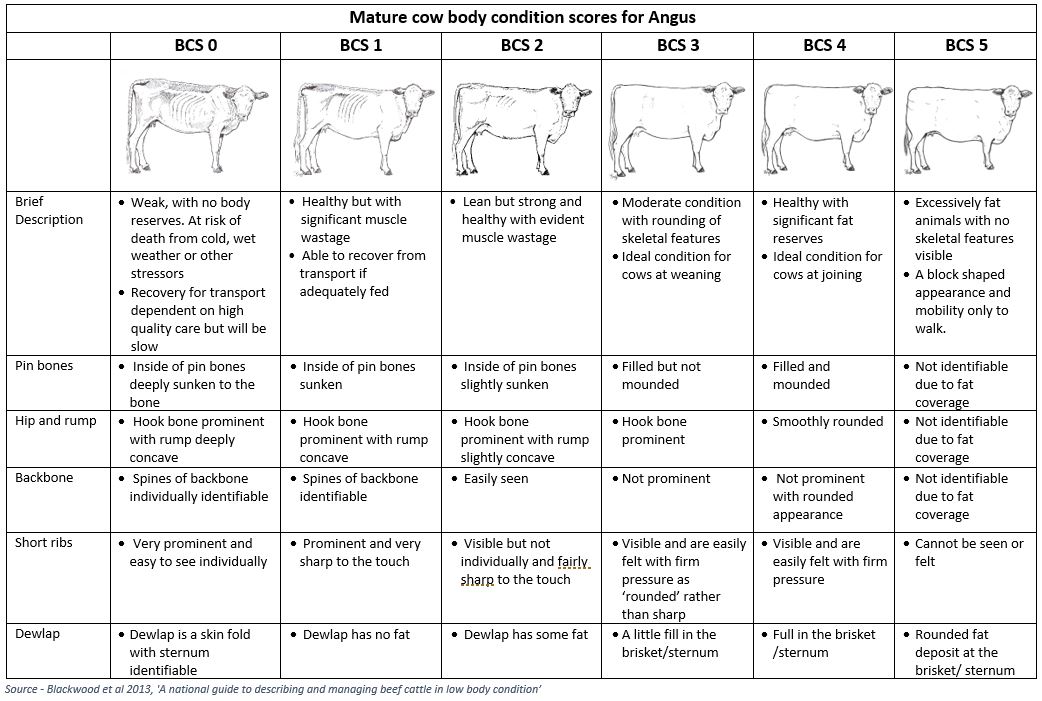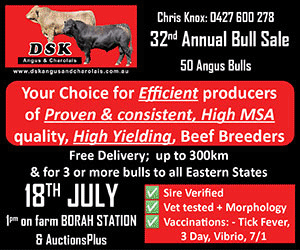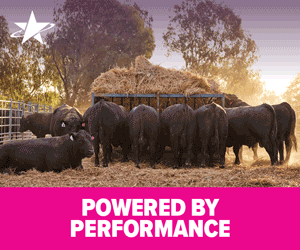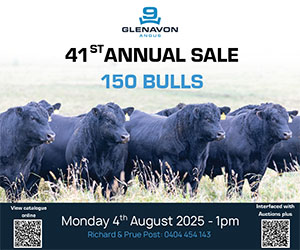Collecting Mature Cow Body Condition Scores
Mature cow body condition assesses the body condition of mature females and are measured as visual scores.
Recording mature cow body condition score data
Mature cow body condition scores are collected using a 0-5 scoring scale based on the visual appearance of the animal.
Half scores (i.e. 1.5,2.5,3.5,4.5) can be used to identify animals who exhibit a body condition, which is intermediate to the scores listed.
In a “normal” Angus beef herd, where the cows have raised a calf to 200 days prior to weaning, it would be expected that the majority of animals would have a score of 2, 2.5 or 3, with a small percentage of animals receiving scores above 3. Weaning is typically the time of lowest condition score in the production cycle of the cow.
All cows should be scored by the same scorer on the same day. If scorers are changed, appropriate management groups will need to be assigned to capture the variation in scorers.
When should mature cow body condition be collected?
Mature cow body condition scores should be taken when the 200 day weights for the progeny of the females are recorded, which will normally be at, or near the time of weaning.
Measurements can also be repeated at the start of joining and pre-calving for any members who are willing to collect multiple measurements throughout the year.
- It is important that there is some variation in the scores that are collected. Scoring all the animals in a group with the same body condition score does not identify any differences in body condition between animals, and consequently does not provide any useful information.
- Management group information should be recorded for any cows or group of cows that have been treated differently or exposed to significant non-genetic influences prior to scoring that may affect their condition score.
- Management group information should be specified for any cows or groups of cows that have been managed differently in previous years where the difference in management is still considerably affecting their weight relative to other cows born in the same year. For example, cows that may not have weaned a calf in the previous year, cows that have previously been part of the show team but are now part of the main herd, or in situations where some cows of the same age were calved down at different ages (e.g. 2, 2.5 and 3 years of age).
- Mature cow body condition scores should be recorded for all females in a mob on the same day. Mature cow body condition scores for cows that have been collected on different days will not be directly compared.
- Mature cow body condition scores should be recorded for the whole mob. Collecting “occasionally” scores, or only collecting scores for a subset of cows is of no value.
- Cows which have reared a calf should be assigned a separate management group to those in the mob who have not reared a calf prior to scoring.
- It is important that both a consistent scoring method is used and the same person scores all animals that are being assessed in the herd on a particular day.
- Additional information on the collection of mature cow body condition scoring can be found in the Angus Australia “Paddock Guide to Body Condition Scoring” booklet. Copies are available from Angus Australia.
- The time of the production cycle at which mature cow body condition scores have been recorded should be carefully noted when submitting scores to Angus Australia. i.e. weaning, pre-calving or joining.
- Consideration should be given to also collecting mature weight and height measurements when collecting mature cow body condition score.
Click here to print
Click here to access the Paddock Guide to Body Condition Scoring
Angus Australia acknowledges the funds provided by the Australian Government through the Meat & Livestock Australia Donor Company (MDC).
This resource was created as a result of a collaboration between Angus Australia and Meat & Livestock Australia Donor Company (MDC) (Project P.PSH.1063).








